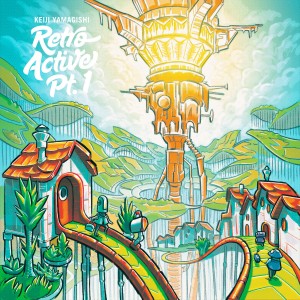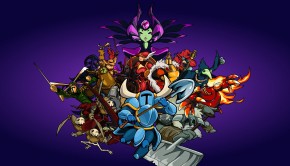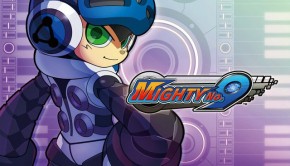Retro-Active Pt. 1
 |
Album Title: Retro-Active Pt. 1 |
| Record Label: Brave Wave Music |
|
| Catalog No.: N/A |
|
| Release Date: February 5, 2015 |
|
| Purchase: Buy at Bandcamp |
Overview
Retro-Active Pt. 1 marks the first of a series of three original solo albums by Keiji Yamagishi and his return to the music industry. This first short album is full of bright chiptune tracks inspired by the music of retro gaming days, as well as some remixes by fellow musicians. However, rather than the antiquity often associated with chiptunes, the album has the idea of a “futuristic and emotional chiptunes world” in mind. Each song paints a different angle of this world, and the result is a fun and imaginative album that is sure to delight.
Body
“First Contact” is the opener of the album, introducing Yamagishi’s vision. An introductory buildup leads into a track that definitely has some futuristic vibes to it. Yamagishi shows that he still knows his way around the chiptune soundscape with a good variety of sounds throughout, especially evidenced by the stripped down midsection that somehow works with what sounds like a telephone ringing on the side. The later track “Kaleidoscope” featuring Manami Matsumae is also in the same electronic vein, this one being funkier with a space atmosphere and a bit of attitude reminiscent of early dance tracks. The last original song is “Drifting Love”, which is charming song with a poppy structure and composition. This is realized with the help of a vocaloid during the chorus, though the real standout is the verses with synths able to produce tangible emotion and feeling. The brightness of the track may be a bit much at times, but its undeniably catchy, fun, and even a bit moving.
The other half of the original tracks have some rock elements combined with the chiptune, mainly with the addition of electric guitars. “Bounty Hunter” is starts off on the dance side of things with its pulsing rhythm, claps, and a great lyrical melody, before shifting seamlessly into its rock-tinged chorus. “Starfish Cluster” is a perfect beach accompaniment track, at first relaxed and even a bit hazy, before upping the pace in the latter half with a dose of energy for good old-fashioned fun in the sun. “Memories of T” featuring Stemage has the most rock influence of the tracks in both arrangement and composition, again featuring a fairly lyrical melody and a darker, more pressing atmosphere that also sometimes gives the track a JRPG boss battle feel.
Three remixes by Yamagishi’s friends close off the album. The first two are remixes of the opening track “First Contact”. Takahiro Izutani’s remix brings hardstyle breakbeat to the album, and the track has a good progression to it keeping things interesting. Riki Arai’s remix adds dupstep to the album, which the track is heavy on in the first half. Just before things can get tiresome Arai changes things up and shifts the tempo to a fun triple time. It’s a bit longer than it needs to be, but there are some great moments in the remix. Lastly, newcomer Smoke Thief’s “Bounty Hunter” remix eases the album out with a chill dub mix that only takes fragments on the original melody. Although that melody was one of the highlights of the original track, Smoke Thief makes up for its loss with a strong meditative atmosphere and a wonderfully wistful guitar line in the second half. It’s also a wonderful closing to the album, capping things on a fitting note that looks ahead to Yamagishi’s next scheduled projects.
Summary
Yamagishi’s first solo album is an enjoyable chiptunes album, with fun, memorable melodies and a good variation of sounds. Though it isn’t particularly revolutionary, it is confident in its sound and identity with a great mix of rock elements and the wide variety of chiptune sounds. The remixes are also quite good, and fit in well with the album without being repetitive. It will certainly be interesting to see where Yamagishi takes his ideas from here, and whether or not he will be able to find a more unique voice in the genre. Until then, Retro-Active Pt. 1 is a fine entry into the growing contemporary chiptunes field that is worth a listen.
Do you agree with the review and score? Let us know in the comments below!
4
Posted on February 8, 2015 by Christopher Huynh. Last modified on January 19, 2016.














